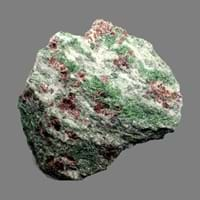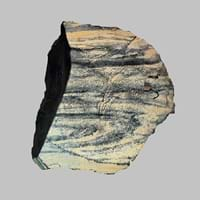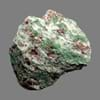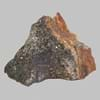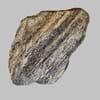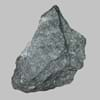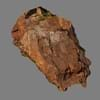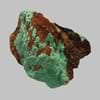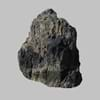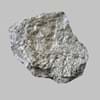Eclogite and Oil shale
Definition
Definition
Eclogite is an extreme metamorphic rock, formed by regional metamorphism of basalt rock under very high pressure and temperature
Oil Shale is a fine-grained sedimentary rock from which oil is extracted
History
Discoverer
René Just Haüy
Unknown
Etymology
From French, Greek eklogē selection with reference to the selective content of the rock + -ite1
From Old English scealu in its base sense of thing that divides or separate
Class
Metamorphic Rocks
Sedimentary Rocks
Sub-Class
Durable Rock, Medium Hardness Rock
Durable Rock, Soft Rock
Family
Group
Not Applicable
Not Applicable
Other Categories
Fine Grained Rock, Opaque Rock
Fine Grained Rock, Opaque Rock
Texture
Texture
Earthy
Splintery
Color
Black, Brown, Colourless, Green, Grey, Pink, White
Black, Brown, Buff, Green, Grey, Red, Yellow
Maintenance
Less
Less
Durability
Durable
Durable
Water Resistant
No
Yes
Scratch Resistant
Yes
No
Stain Resistant
Yes
Yes
Wind Resistant
Yes
No
Acid Resistant
No
No
Appearance
Dull, Banded and Foilated
Muddy
Uses
Architecture
Interior Uses
Decorative Aggregates, Interior Decoration
Not Yet Used
Exterior Uses
Paving Stone, Garden Decoration
Not Yet Used
Other Architectural Uses
Curbing
Not Yet Used
Industry
Construction Industry
Not Yet Used
Cement Manufacture, Construction Aggregate, for Road Aggregate, Serves as an Oil and Gas Reservoir rock
Medical Industry
In Chemical and Pharmaceutical Industry, Medicines and Cosmetics
Not Yet Used
Antiquity Uses
Artifacts
Artifacts
Other Uses
Commercial Uses
Creating Artwork, Gemstone
An Oil and Gas Reservoir
Types
Types
Not Available
Carbonate-rich Shale, Siliceous Shale and Cannel Shale
Features
Available in Lots of Colors and Patterns, Generally rough to touch, Is one of the oldest rock
Easily splits into thin plates, Generally rough to touch, Is one of the oldest rock, Very fine grained rock
Archaeological Significance
Monuments
Not Yet Used
Not Yet Used
Famous Monuments
Not Applicable
Not Applicable
Sculpture
Not Yet Used
Not Yet Used
Famous Sculptures
Not Applicable
Not Applicable
Pictographs
Used
Not Used
Petroglyphs
Used
Not Used
Figurines
Not Yet Used
Not Yet Used
Fossils
Absent
Present
Formation
Formation
Eclogite forms from high-pressure metamorphism of mafic igneous rocks mainly, basalt or gabbro as it plunges into the mantle in a subduction zone.
Oil Shale forms on the beds of seas and lakes and its formation starts with the organic debris settling and accumulating at the bottom of a lake or sea which are then transformed into rock with the help of high temperature and pressure.
Composition
Mineral Content
Amphibole, Coesite, Corundum, Dolomite, Garnet, Kyanite, Lawsonite, Paragonite, Phengite, Pyroxene, Quartz, Rutile, Zoisite
Albite, Biotite, Calcite, Chert, Chlorite, Dolomite, Hematite, Micas, Muscovite or Illite, Pyrite, Quartz, Silica, Sulfides
Compound Content
Aluminium Oxide, NaCl, CaO, Carbon Dioxide, Iron(III) Oxide, Magnesium Carbonate, MgO, Sodium Oxide, Potassium, Sodium
Ca, Fe, Mg, Silicon Dioxide, Sodium
Transformation
Metamorphism
No
No
Types of Metamorphism
Not Applicable
Not Applicable
Weathering
Yes
Yes
Types of Weathering
Mechanical Weathering
Biological Weathering, Chemical Weathering, Mechanical Weathering
Erosion
Yes
Yes
Types of Erosion
Chemical Erosion, Sea Erosion
Chemical Erosion, Sea Erosion, Water Erosion
Properties
Physical Properties
Hardness
3.5-4
2-3
Grain Size
Fine Grained
Very fine-grained
Fracture
Not Available
Not Available
Streak
White
White
Porosity
Less Porous
Highly Porous
Luster
Subvitreous to Dull
Dull
Cleavage
Perfect
Slaty
Toughness
Not Available
2.6
Specific Gravity
2.86-2.87
2.2-2.8
Transparency
Opaque
Opaque
Density
3.2-3.6 g/cm3
2.4-2.8 g/cm3
Thermal Properties
Specific Heat Capacity
Not Available
0.39 kJ/Kg K
23
Resistance
Heat Resistant
Heat Resistant, Impact Resistant
Reserves
Deposits in Eastern Continents
Asia
India, Kazakhstan, Kuwait, Russia, South Korea, Thailand, Turkey
Bangladesh, China, India, Israel, Jordan, Russia, Syria, Thailand, Turkey
Africa
Ethiopia, Morocco, South Africa
Ethiopia, Kenya, Morocco, South Africa, Tanzania
Europe
France, Germany, Italy, Norway, Scotland
Austria, France, Germany, Greece, Italy, Romania, Scotland, Spain, Sweden, Switzerland
Others
Greenland
Greenland, Not Yet Found
Deposits in Western Continents
North America
Canada, Costa Rica, Panama, USA
Canada, USA
South America
Argentina, Brazil, Colombia, Ecuador
Bolivia, Brazil, Chile, Colombia, Ecuador, Peru, Venezuela
Deposits in Oceania Continent
Australia
Central Australia, New Zealand, Queensland
New South Wales, New Zealand, Queensland, Victoria, Western Australia
All about Eclogite and Oil shale Properties
Know all about Eclogite and Oil shale properties here. All properties of rocks are important as they define the type of rock and its application. Eclogite belongs to Metamorphic Rocks while Oil shale belongs to Sedimentary Rocks.Texture of Eclogite is Earthy whereas that of Oil shale is Splintery. Eclogite appears Dull, Banded and Foilated and Oil shale appears Muddy. The luster of Eclogite is subvitreous to dull while that of Oil shale is dull. Eclogite is available in black, brown, colourless, green, grey, pink, white colors whereas Oil shale is available in black, brown, buff, green, grey, red, yellow colors. The commercial uses of Eclogite are creating artwork, gemstone and that of Oil shale are an oil and gas reservoir.
|
||
|
||
|
